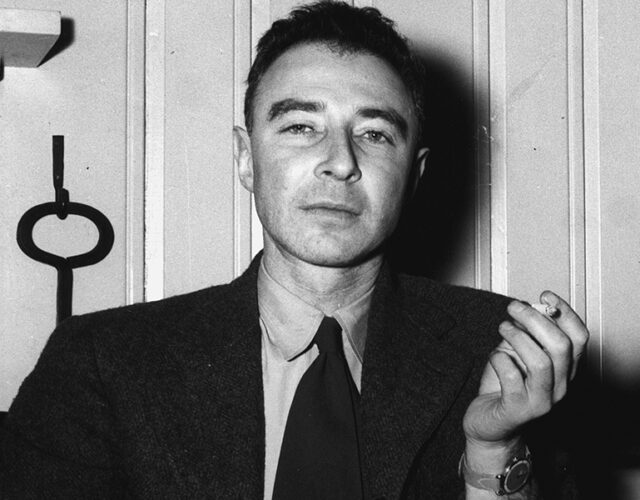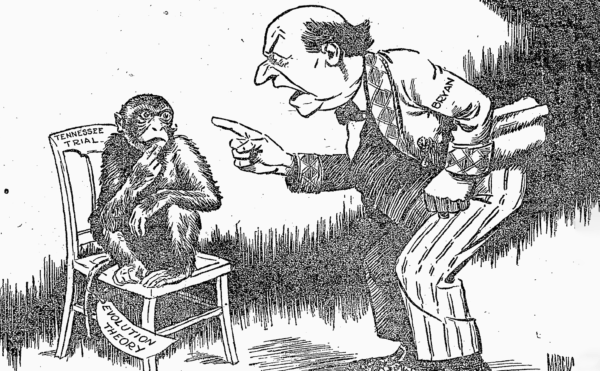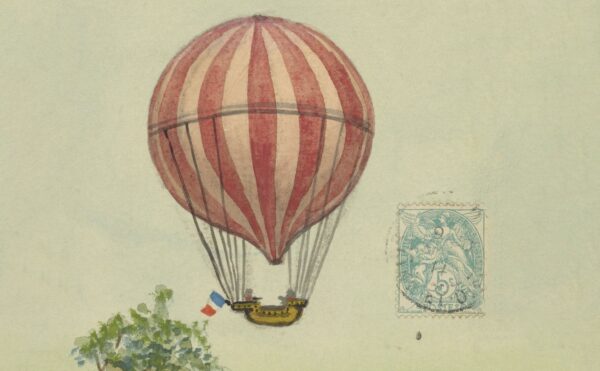He could’ve been the next Einstein. Instead, Robert Oppenheimer fritted away his talents on trendy science and political gamesmanship—and it burned him deep in his soul.
About The Disappearing Spoon
The Science History Institute has teamed up with New York Times best-selling author Sam Kean to bring a second history of science podcast to our listeners. The Disappearing Spoon tells little-known stories from our scientific past—from the shocking way the smallpox vaccine was transported around the world to why we don’t have a birth control pill for men. These topsy-turvy science tales, some of which have never made it into history books, are surprisingly powerful and insightful.
Credits
Host: Sam Kean
Senior Producer: Mariel Carr
Producer: Rigoberto Hernandez
Audio Engineer: Jonathan Pfeffer
Transcript
In March 1926, four students from Cambridge University took a vacation in Corsica, an island off France. For ten days, they biked around and hiked the craggy hills and stuffed themselves with seafood in decadent sauces and drank wine.
One night they got caught in a storm. The friends ducked into an inn and huddled around a fire. And like many young people aching to assert themselves, they had a pretentious chat about literature. One declared that Tolstoy was the writer he most admired. But another one—Robert Oppenheimer, future father of the atomic bomb—just shook his head. “Dostoyevsky is superior,” Oppenheimer insisted. “He gets to the soul and torment of man.”
Uncomfortably, the friends soon saw a bit of that torment. Over dinner a few nights later, Oppenheimer seemed agitated. Now, he was always restless both mentally and physically—a fidgety fellow whose quick mind leapt from topic to topic. But that night he seemed especially agitated. He wouldn’t say why.
Then a waiter interrupted to tell Oppenheimer when the next ferry was returning to the mainland. His friends were surprised—why was Robert leaving early?
Oppenheimer said he couldn’t bear to tell them. But after some more wine, he announced himself ready to confess. His friends no doubt winked and nudged each other. It had to be some love affair.
It wasn’t. Oppenheimer began talking about his tutor back in Cambridge. He hated the man. So before leaving on vacation, he’d injected poisonous chemicals into an apple. Then he’d left the apple on his tutor’s desk, to murder him.
The revelation obviously horrified his friends. But it also baffled them. How could someone spend his days wandering Corsica, eating and biking and discussing literature while a murder plot was unfolding? It was their first glimpse into the dark, twisted, Dostoyevsky-ian soul of Robert Oppenheimer.
Robert Oppenheimer came from money. Lots of money. His father ran a business importing textiles. Robert was born in 1904 into a New York penthouse with paintings by Van Gogh and Picasso on the wall.
And his father spoiled Robert and his brother Frank. Once, when Frank mentioned he’d like to read some Geoffrey Chaucer poems, his father ran right out and bought a copy—a rare binding from 1721. Anything the boys wanted, he handed them on a platter.
Perhaps not surprisingly, Robert grew up pretentious and unpopular. He once told a friend, “Ask me a question in Latin, and I shall answer you in Greek” I mean, what a twerp. He later called himself a “repulsively good little boy.”
Other kids sensed this, and bullied him. At summer camp once, the other campers stripped him naked, painted his privates green, and made him sleep in an icehouse overnight.
Feeling unloved, Oppenheimer withdrew into a world of poetry and physics. As he once told his brother, “I need physics more than I need friends.” He raced through school, gobbling up material, and graduated at 17—a striking young man with pale blue eyes and thick black curly hair. He was also cornstalk-thin. He ate mostly chocolate and artichokes. His favorite lunch was what he called a “black and tan”—peanut butter toast with chocolate syrup.
Obviously Oppenheimer attended college at Harvard. Where else would one go? He started racing through classes again, taking six every semester. Starting his junior year, he began taking graduate courses in physics—and audited even more courses on top of that.
Now, there’s no way he could have absorbed all the material in six-plus Harvard classes. His quick mind allowed him to skate by. But he later acknowledged the harm of this rapid-fire approach to learning.
As a scientist, Oppenheimer got bored easily and liked to jump around to different fields. But he didn’t simply go wherever his fancy led him. He always jumped into trendy fields—he liked being at the center of things.
And when he jumped into a trendy new field, his quick mind often provided some important insight. But because he’d raced through his basic physics classes at Harvard, he lacked the fundamental knowledge to make anything more than initial, and sometimes superficial, contributions. This deficit would haunt him the rest of his life.
After Harvard, Oppenheimer went to Cambridge University in England. There, he badly wanted to work with the legendary physicist Ernest Rutherford. But Rutherford was suspicious of Oppenheimer and rejected him.
The rejection shocked Oppenheimer. He was used to getting whatever he wanted. Now, the scientist Oppenheimer ended up working with was no slouch—a Nobel Prize winner. But the rejection burned him, and set the tone for a tumultuous stint at Cambridge.
The other scientist put Oppenheimer to work making strips of beryllium for a research project. Perhaps he was trying to gauge Oppenheimer’s dexterity for lab work. Or humble him. Regardless, Oppenheimer considered this menial task beneath him. He also found the lectures at Cambridge boring. Worst of all, he was lonely, far removed from the family that spoiled him. Given his frustrations, and his high-strung personality, he fell into a trough of depression.
He also grew mentally unstable. One of his few friends in England was Francis Fergusson. Fergusson’s family owned a ranch in New Mexico where Oppenheimer stayed once while recovering from illness.
Fergusson was also studying physics in England. He wasn’t half as gifted as Oppenheimer, but he was far more diligent. As a result, Fergusson was thriving in both his classes and his social life. He even got engaged in the mid-1920s.
So how did Oppenheimer react to his friend’s engagement? It enraged him. He leapt on Fergusson, wrestling him to the ground and trying to choke him.
Now, no one got hurt here. Having lived on a ranch, Fergusson was buff and strong. Oppenheimer was a soft rich kid, and weighed just 130 pounds. Fergusson tossed him off like a blanket and told him to grow up. Still, the scene disturbed Fergusson. Was his friend becoming unhinged?
Fergusson was right to worry. Like all Cambridge students, Oppenheimer had an official tutor. This was an older graduate student who acted like a mentor. His tutor’s name was Patrick Blackett. Blackett was robust, popular, and good with his hands—everything Oppenheimer wasn’t. Oppenheimer developed a seething hatred for him.
Things came to a head in 1926 when Oppenheimer put a poisoned apple on Blackett’s desk, then left to vacation in Corsica.
Thankfully, Blackett never ate the apple. But Oppenheimer’s Corsica companions spilled the beans, and when Cambridge University found out, the administrators decided to press charges of attempted murder. And they would have. Except, Oppenheimer’s rich father happened to be visiting that week. He begged Cambridge to spare his precious, genius son. So, Oppenheimer got off with mere probation.
Oddly, Oppenheimer’s mental health improved after he tried to murder his tutor. It helped that he transferred from Cambridge to the University of Göttingen in Germany.
Göttingen was the center of the new science of quantum mechanics, and had frequent visitors like Niels Bohr. In Göttingen, Oppenheimer’s quick mind impressed Bohr and many others, and his old intellectual swagger returned. During Oppenheimer’s Ph.D. defense, one of the examining professors admitted that he—the professor—was trembling in fear the whole time. He was worried that Oppenheimer, a grad student, was about to turn the tables and start interrogating him.
Despite the good it did him, Göttingen had one negative effect on Oppenheimer. The university was the center of the physics world, and Oppenheimer grew addicted to the limelight. After that, he was always chasing the dragon of fame and renown. As his friend Freeman Dyson said, “He always wanted to be at the center of things. This is a good quality for politicians and soldiers but bad for original thinkers. He paid too much attention to famous people working on fashionable topics.”
After Göttingen, Oppenheimer became a professor at Cal-Berkeley. There was some brilliant physics going on there. Unfortunately, Oppenheimer couldn’t focus long enough to make the big splash everyone expected. For instance, in the early 1930s, he co-wrote a paper on what’s called the photoelectric effect. This describes how light rays can eject electrons from metals. Albert Einstein actually won his Nobel Prize for work on the photoelectric effect.
And there were more prizes to be won in the field—just not by Oppenheimer. After co-writing the paper with a graduate student, Oppenheimer got itchy and jumped to another topic that seemed sexier. Meanwhile, the graduate student kept plugging away. He was dimmer than Oppenheimer but had more discipline. He resolved some problems that limited the earlier paper—and soon won a Nobel Prize himself. The impatient Oppenheimer missed out.
This tendency to leap from topic to topic frustrated Oppenheimer’s colleagues. Especially when he’d jump to areas outside of physics. He’d simply drop physics for months to read Proust or learn Sanskrit. He also threw himself into trendy leftwing politics, like throwing fundraisers for the communists in the Spanish Civil War.
Plus, instead of choosing sharp graduate students to challenge and push him, Oppenheimer recruited impressionable types who fawned over him. With one student, Melba Phillips, he even tried seducing her. He drove her to a secluded spot overlooking San Francisco one night and parked his car—a wildly inappropriate situation to put a student in.
But if you’re fearing this scene will end with another crime, don’t worry. After parking, Oppenheimer suddenly decided to take a walk. Phillips, sitting alone, ended up falling asleep in the car. She awoke hours later to find Oppenheimer still missing. Frantic, she called the police, who searched the city—and found Oppenheimer asleep at home. He apologized, explaining that he’d forgotten about Phillips and their date. He’d had other things on his mind.
More commonly, Oppenheimer displayed contempt for his graduate students. In seminars, he’d snarl and dismiss their ideas as stupid. His students worshipped him anyway. Colleagues used to snicker about how they talked like him and even walked like him. One Russian student tried to take the same class with him four times, just to bask in his presence. He finally kicked her out—only to let her back in when she went on a hunger strike. These were less students than disciples.
Having disciples around only magnified Oppenheimer’s self-importance. He seemed to think of himself as an Ubermensch, someone too good for little things like double-checking his work. As a result, he developed a reputation for sloppiness. He’d race through calculations on his papers as if merely auditing the topic.
His friend Freeman Dyson remembers Oppenheimer as constantly fidgeting—the most restless person he’d ever met. Someone once said of Oppenheimer that no man was ever photographed more often with a cigarette. He smoked largely because he couldn’t sit still and just be with his own thoughts. As Dyson once said, Oppenheimer lacked sitzfleisch.
In a literal sense sitzfleisch means “sitting flesh” in German. The butt. But it’s also slang for the ability to sit down and work, work, work a problem until you crack it. Oppenheimer lacked this skill.
His most notorious deficit of sitzfleisch occurred in 1939. Oppenheimer and a colleague were playing around with Einstein’s relativity equations. They noticed something funny. If a gigantic star burned through all its fuel and collapsed on itself, its gravitational field would be so intense that not even light could escape it. They’d just discovered black holes.
Now, Einstein hated the idea of black holes—even though his own equations implied that they existed. Einstein found black holes monstrous, abhorrent. But Oppenheimer was willing to go places Einstein wasn’t. It was brilliant work.
So how did Oppenheimer capitalize on his brilliant insight? He—didn’t. He published a mistake-filled paper about black holes, then drifted to other topics. Over the next few decades, black holes became one of the hottest fields in physics. As I’ve mentioned in previous podcasts, they led to Stephen Hawking’s biggest breakthroughs. And they’re now on the forefront of efforts to unite relativity and quantum mechanics. Beyond being frickin’ cool, black holes are a big deal scientifically.
But even though Oppenheimer lived 27 years after his initial paper, he never published another word about black holes. People asked him about this sometimes—why he’d quit. He would treat this question as bad manners, as if they’d asked his bowel movements or some other personal matter. Then he’d change the subject. But in a way, this topic was personal. Like Leonardo da Vinci, Oppenheimer simply didn’t have the gumption to see his masterpiece through. And it burned him.
A few years after his black hole paper, Oppenheimer joined the Manhattan Project to build the atomic bomb. And despite my ragging on Oppenheimer’s science, he did an incredible job as an administrator there.
As a leader, his quick mind proved a huge asset; he immediately penetrated to the heart of every matter. And if he didn’t have the gumption to stick things through, well, that’s what underlings were for. For better or worse, atomic bombs probably never would have been built without Robert Oppenheimer.
After World War II, the vast majority of scientists on the Manhattan Project were relieved. They’d done their duty, and could now get back to doing what they loved—puttering around the lab, tinkering with equations. Real science.
Not Oppenheimer. During the war he’d been important, and he craved more fame. Within two weeks of the war’s end, he was briefing the Secretary of War about atomic weapons. He was already slipping into the skin of another—even less scientific—Robert Oppenheimer. The political mover. Inevitably, his science suffered. After the Manhattan Project, Oppenheimer published just five more papers his whole life—little things he’d dash off. He was too busy playing politics.
And different politics before. He shifted sharply away from the trendy leftwing scene at Berkeley. In fact, he later named names to authorities and got close friends fired for their past involvement in the communist party. All to prove that he himself was politically trustworthy.
But this foray into politics ended badly. In 1954, a few conservative scientists damned Oppenheimer as a communist sympathizer and a danger to national security. Contentious hearings were held, and Oppenheimer was stripped of his security clearance. It was a humiliating ordeal, and he withdrew from the political world in disgrace.
Most biographers treat those humiliating hearings as the central tragedy of Oppenheimer’s life. But the friends who knew him best saw things differently. They knew about Oppenheimer’s frustrating brilliance—an incandescent mind that simply couldn’t focus and see things through. To them, the tragedy of Oppenheimer’s life was that he never became the Einstein he could have been.
And the saddest part was, Oppenheimer knew this. Given all the cigarettes he smoked, no one was surprised when Oppenheimer developed cancer in 1965. He sank quickly, and was bedridden by 1967.
Oppenheimer’s wife Kitty was reduced to begging his friend Freeman Dyson to visit him on his deathbed. She asked Dyson to engage Robert in some scientific work. She said that he realized he’d squandered his potential, and wanted to give science one last go. She hoped Dyson could spur him on.
But Dyson declined. As he later said, “I agreed with Kitty’s diagnosis” about the roots of his despair. “But I had to tell her that it was too late. I told her that I would like to sit quietly with Robert and hold his hand. His days as a scientist were over. It was too late to cure his anguish with equations.”




